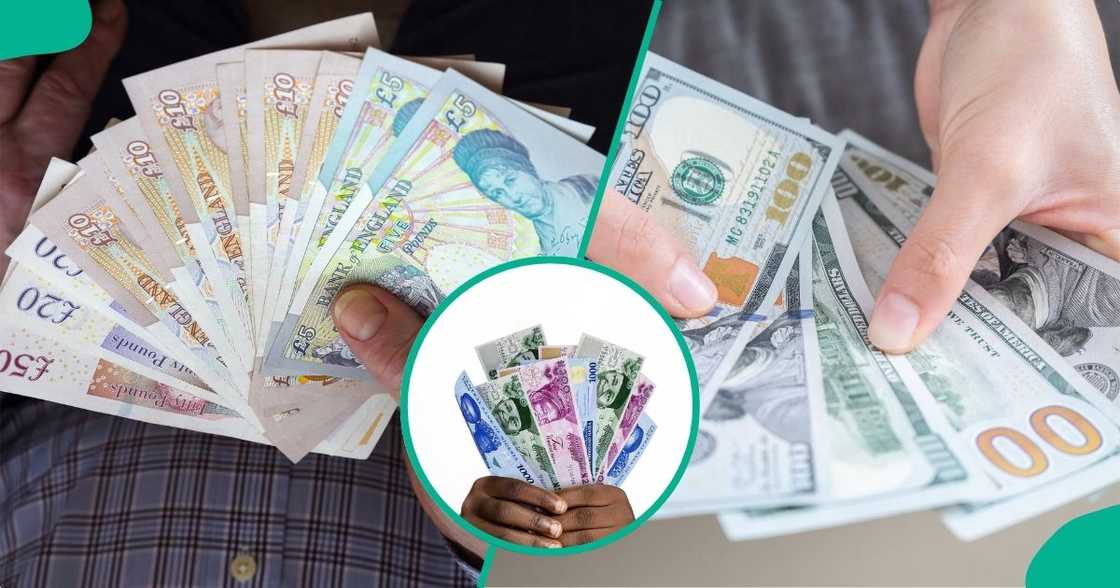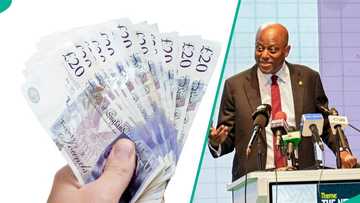Access, Zenith, UBA, Other Banks, Dealers Sell Dollar at New Rate as USD Shortage Emerges
- The Nigerian currency fallen in value due to scarcity of foreign exchange market in the official market
- Data from the Central Bank of Nigeria (CBN) shows that the local currency dipped as dollar inflows dipped in the market
- However, Nigeria’s external reserves has risen to about 42.669 billion since September 2025, hitting a five-year high
Pascal Oparada, a reporter for Legit.ng, has over ten years of experience covering technology, energy, stocks, investment, and the economy.
Nigeria’s foreign exchange market witnessed renewed pressure this week as the naira weakened further against the US dollar despite a steady rise in the country’s external reserves.
The exchange rate closed at ₦1,475.35 per dollar on Monday at the official window, with intraday rates touching as high as ₦1,482, according to data released by the Central Bank of Nigeria (CBN).

Source: Getty Images
The development reflects growing dollar scarcity in the local market, even as leading financial institutions such as Access Bank, Zenith Bank, and United Bank for Africa (UBA), alongside other authorized dealers, adjusted their foreign exchange rates to reflect market realities.

Read also
Big win for naira: CBN announces $8.6bn FX turnover as dollar inflows surge, reserves hit new high
Wider spread between official and parallel market
Market analysts say the current depreciation underscores a liquidity shortfall and persistent demand pressures on the greenback, driven by importers, manufacturers, and investors seeking to hedge against further naira decline.
The gap between the official and parallel market rates widened to about ₦25 this week, signaling renewed tension in the FX market.
The naira’s weekly loss of roughly ₦20 at the official window suggests that dollar supply has tightened, even though inflows from exporters, non-bank corporates, and remittances have continued.
However, the missing link remains limited dollar inflows from International Oil Companies (IOCs), which traditionally account for a significant portion of the market’s liquidity.
In addition, the CBN’s intervention through direct FX sales appears to have slowed in recent weeks, adding to the pressure on commercial banks and authorized dealers.
Rising reserves offer a silver lining
In contrast to the tightening liquidity, Nigeria’s gross external reserves rose slightly to $42.681 billion, up from $42.669 billion recorded the previous day.
The consistent buildup, largely driven by improved non-oil inflows and modest oil receipts,offers a glimmer of hope that the CBN may have more room to stabilize the naira if the current uptrend persists.

Source: Getty Images
Analysts note that the rise in reserves, though marginal, reflects cautious optimism that Nigeria’s macroeconomic fundamentals are improving under recent fiscal and monetary reforms.
These include the unification of exchange rates, moderation of fuel subsidies, and renewed efforts to attract foreign investment.
Oil prices fall, but Nigeria’s reserves hold
Interestingly, the rise in reserves comes at a time when global oil prices are heading for a third consecutive weekly decline, weighed down by signs of oversupply in the market.
West Texas Intermediate (WTI) crude traded near $57 a barrel on Friday, marking its longest losing streak since March.
The dip in oil prices has been compounded by India’s reduced purchases of Russian crude, as major economies recalibrate their sourcing strategies under geopolitical pressures.
Despite these global headwinds, Nigeria’s ability to maintain steady reserves suggests that non-oil sectors—particularly remittances and portfolio investments—are cushioning the impact.
Outlook: Fragile stability ahead
While Nigeria’s growing reserves signal improved foreign currency management, the persistent dollar shortage and widening exchange rate gap underline the fragility of the current stability.
Market watchers believe sustained inflows from IOCs, improved export proceeds, and continued policy discipline will be critical to reversing the naira’s decline and restoring investor confidence in the months ahead.
CBN announces $8.6bn FX turnover as dollar inflows surge
Legit.ng earlier reported that the CBN has revealed that the country’s monthly FX turnover has risen to a new high.
According to CBN’s deputy governor, Mohammed Sani Abdullahi, Nigeria’s monthly FX turnover stands at $8.6 billion in 2025.
The CBN’s deputy governor stated this during an investors forum on the sidelines of the annual meetings of the International Monetary Fund (IMF)/World Bank in Washington, USA.
Source: Legit.ng




